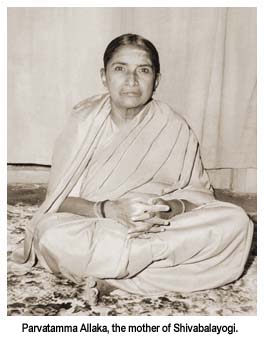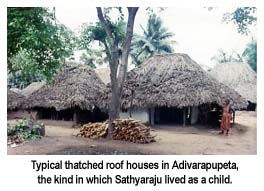|
With the death of Bheemanna, what was already
a difficult situation became severe hardship.
Before Bheemanna died, his first wife, childless Shravanamma, tried to get his agreement to allow her to raise Sathyaraju as her own son. Such an arrangement was not uncommon in rural India when one wife had several children and the other none, but Bheemanna avoided making any commitment. After his death, pressure from other relatives, particularly in light of Parvatamma’s poverty, compelled her to honor Shravanamma’s wishes. When Sathyaraju was five years old, he was taken to the nearby village of Bandarulanka to live with his step-mother. The small boy missed his mother so much that after six months, he was allowed to return to Adivarapupeta. It was at this young age that Sathyaraju confronted his family’s poverty. He was used to getting food whenever he asked, but sometimes he noticed that his mother was sad. He realized that he never saw her eating a proper meal. Once when he asked for food, he asked his mother to eat with him. She told her young son that she was busy working and would eat later. The boy insisted, so Parvatamma set aside half of the food and said she would have it a little later. Sathyaraju finished his food and made as if he was going outside. Instead, he hid behind the door and kept a watch. Nearly two hours passed and the boy waited patiently to see whether his mother ate any food. What he doubted was true. She took none.
After some time, Sathyaraju came out
pretending as if he were coming into the house from outside. He called his
mother and asked for food, as he usually did, saying he was hungry.
Parvatamma gave him the share of food that she had set aside. When
Sathyaraju asked whether she had eaten her portion, she assured him that she
had. Then the boy confronted his mother, and she could not help but cry. Sathyaraju wondered whether he had hurt her, so he went to his grandfather to ask what had happened. Goli Sathyam explained, “You see, we are poor, but you need not worry. Concentrate on your studies. Mother cannot bear her children’s hunger. She eats very little — hardly any proper meal for many days.” The boy demanded to know what poverty was and why they were poor. Grandfather replied, “Your father died when you were barely two years old so your mother has to work to feed her children.” The incident made a strong impression on the five-year-old. From that time on, Sathyaraju committed himself to supporting his mother and family. Village children usually began weaving at age six, helping their elders spin thread and weave cloth. Sathyaraju was only five when he started helping others, earning a paisa or two (one hundredth of a rupee) a day. Soon he was weaving cloth for the family to sell. At age eight, Sathyaraju again was made to live with his step-mother where life was even more difficult. He attended the village school in Bandaluranka, learned quickly, and became accepted as one of the leaders. But his step-mother made him weave a half a saree each day. When he was finished, he was sent on errands to buy cotton, deliver and sell the finished cloth at nearby markets, and work on household chores. He was not allowed to play with the other children. Soon he was taken out of school to work at home all day. Parvatamma, although poor, always had made sure that her children had food to eat. Sathyaraju’s step-mother fed him small meals. He was often hungry and the hard work was difficult on his growing body. Sathyaraju suffered these difficult conditions until he discovered that his step-mother was illegally dealing in opium. Some friends tipped him off that officials were on their way to search his step-mother’s house for opium. He ran home, confronted his step-mother, and removed the drugs before the search party arrived. He threatened to return to Adivarapupeta unless she gave up dealing, and she, somewhat shaken by the experience, promised. However, Sathyaraju soon discovered that she was still dealing opium, so he asked permission to return to Adivarapupeta. By then his step-mother was tired of his criticism so she consented. He had been with her for five months. Sathyaraju returned to his step-mother a third time when he was twelve years old and she was seriously ill. He helped nurse her to health, then discovered that she was still dealing in opium. Again he expressed his anger, but she only tried to conceal her activities. Each was angered by the other, and the disputes culminated in an argument at dinner one night when he resolved never to step foot in his step-mother’s house again. He slept on the verandah that evening, and despite his step-mother’s change of heart and appeals, he left for Adivarapupeta the next morning and never returned. |
 |
|
His Life |
| birth |
| childhood |
| childhood stories |
| enlightenment |
| beginning tapas |
| early obstacles |
| four directions |
| tapas completion |
| Adivarapupeta |
|
Ardhanarishwara Linga & Devi |
| India travels |
|
Banagalore ashram temple |
| Adivarapupeta ashram |
| in the West |
| mahasamadhi |
|
|
| yogi |
| religions |
| spiritual leaders |
| Jesus & Buddha |
| God |
| forms of God |
| guru-devotee |
| Swamiji's mission |
| initiation, vibhuti |
| meditation |
| samadhi (enlightenment) |
| tapas & Self realization |
| bhajans(devotional song) |
|
bhava samadhi (spiritual trance) |
| world conditions |
| foundation |
| Swamiji's words |
| Virtual Darshan |
|
|
|
Shri Shivabalayogi Maharaj
International Trust P.O. Box 293 Langley, WA 98260 U.S.A. info@Shiva.Org |
 Without
a husband to support her children, Parvatamma relied upon her own work and
whatever help she could get from her aging father, Goli Sathyam. They were
among the poorest in a poor village. She not only wove cloth, she made dosas,
thin pancakes made from dried legume and rice flour, to sell in the village.
Without
a husband to support her children, Parvatamma relied upon her own work and
whatever help she could get from her aging father, Goli Sathyam. They were
among the poorest in a poor village. She not only wove cloth, she made dosas,
thin pancakes made from dried legume and rice flour, to sell in the village.
